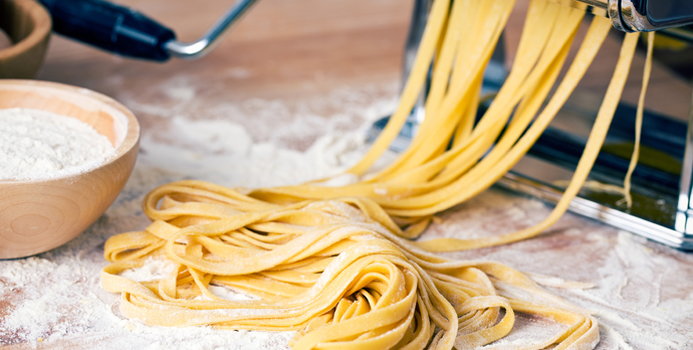If you love pasta but are worried that it will make you gain weight, I have great news for you: new research shows that eating pasta does not cause weight gain. In fact, the research actually discovered that quite the opposite is true. A systematic review and meta-analysis of thirty-two randomized controlled trials including 2,448 participants found that consuming pasta as a part of a low-glycemic index (GI) dietary pattern did not affect body fat and in fact, significantly reduced total body weight and lowered body mass index (BMI) when compared to dietary patterns that were higher in glycemic index.
Glycemic index (GI) is a gauge of how fast a certain food causes your blood glucose to rise. The GI ranks foods on a scale of 0 to 100. High-GI foods are digested and absorbed rapidly, resulting in a quick spike in your blood sugar. High-GI foods are generally high in sugar and refined (processed) carbohydrates, such as pretzels (GI of 83). Low-GI foods are digested and absorbed much slower, causing a more gradual rise in blood glucose levels. Low-GI foods are usually high in fiber, fat, or protein, such as an apple (GI of 28), Greek yogurt (GI of 11), and peanuts (GI of 7).
The Study
Clinician scientists at the Clinical Nutrition and Risk Modification Center of St. Michael’s Hospital in Toronto, Canada, analyzed data from thirty-two previous trials and published their findings in the BMJ Open (formerly British Medical Journal) that included 2,448 individuals who ate pasta rather than other forms of carbohydrates. The median age of the participants was 50 and the BMI was 30.4. In 21 of the 32 clinical trials people who were classified as being overweight or obese were included. The study participants consumed, on average, 3.3 servings of cooked pasta (approximately 1/2 cup) per week in lieu of other carbs. Over a 12-week time period, the participants lost approximately 1.4 pounds and saw their BMI drop by 0.57.
Scientists behind this study reiterate that pasta can absolutely be included in a healthy diet without worry of weight gain or fat accumulation. They plan to study if pasta can be included in other types of healthy diets and yield the same results.
Ways to Incorporate Pasta in a Healthy Way
Make It Part of an Overall Healthy Diet
The key is to include pasta as part of a healthy diet that centers on variety, moderation, portion control, and an abundance of plant foods such as vegetables, fruits, legumes, nuts, seeds, and whole grains.
Pair It with Lots of Veggies
One the easiest ways to keep your pasta portions in check is to use twice as many vegetables as you do pasta in any dish. For example, if you are making pasta con broccoli, use twice the amount of broccoli, peas, and mushrooms as you do bowtie pasta. In fact, you can throw the veggies into the boiling pasta water during the last three minutes of cooking and strain it all in the colander together to avoid dirtying more dishes or including too many steps in your recipe.
Incorporate Lean Proteins
Rather than piling that plate of spaghetti high with gigantic meatballs or fatty Italian sausage, opt for grilled chicken or sautéed shrimp instead. This will cut down on the total calories of the dish while keeping you satisfied
[Image via Shutterstock]



